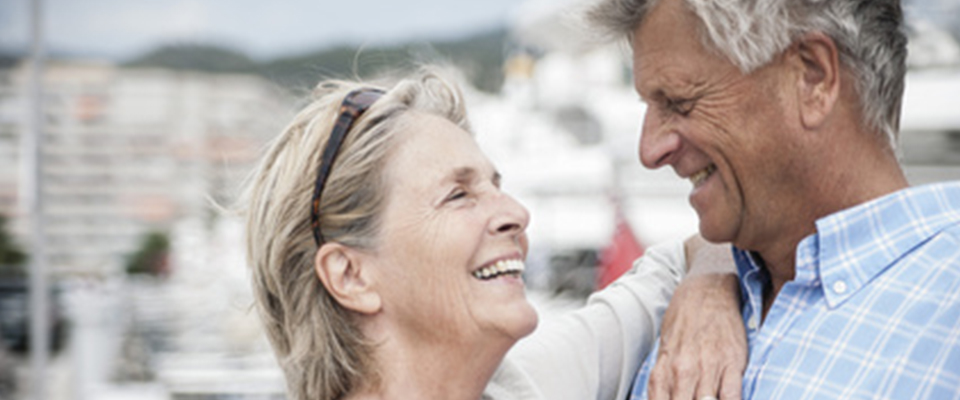What makes me happy is walking through the neighbourhood and seeing couples my age holding hands as they stroll. It was rare years ago to see older adults showing affection in public. Not so today. Love and romance develops, re-kindles, new relationships are forged. It’s all good?
Not exactly. Bad things do happen to good people. A spouse becomes ill, passes away. That’s what happened to Sheryl Sandberg, COO at Facebook and author of Lean In, an influential book encouraging women to take leadership roles. Sandberg is young, with two little kids. Her husband died suddenly while on vacation in Mexico. “Dave was my rock,” she writes. “When I was worried, he said that everything would be okay. When I wasn’t sure what to do, he helped me figure it out….Dave gave me the experience of being deeply understood, truly supported, and completely loved.”
Sandberg was grief stricken and lost after his death. Her new book Option B: Facing Adversity, Building Resilience, and Finding Joy is about how to continue to live a joyful life after bad things happen, the things you can’t easily fix or make go away.
Most of us in our sixties or older have been there. For me it happened when I was relatively young. Both my parents passed away when I was under forty. My father died before I turned thirty, and the fallout was massive. I never spoke about it, even to my first partner, or to friends or family. I really didn’t know what hit me.
My father was a looming figure in my life, smart, effective, quick to judge, short on praise, long on condemnation. No matter how hard I tried, I never did please him, not in the way he wanted me to. After his death I did everything wrong. I kept silent about my pain and pretended my father’s death didn’t affect me. There were so many loose ends that he and I left dangling.
Sandberg says, “We all live some sort of Option B,” the life we never expected to live, but the one we’re handed. Here she is: fabulously successful, brainy, wealthy and privileged, but since the loss of her husband, Dave, she too is making the best of living Option B. Her book is not just about coping. It’s about “the capacity of the human spirit to persevere.”
In my case, it wasn’t until twenty-five years after my father’s death, when I applied for a sabbatical, that the Dean at my college gave me permission to stop trying to please my father. I was going to write a book about his fascinating life, when the Dean remarked, “You don’t need to keep doing this.” He read the proposal for my sabbatical and asked me if this was the book I truly wanted to write. For years, he’d heard me talk about fiction.
“Write you own story, not your father’s,” the Dean said, and almost instantly I was free. I started to write a novel, eventually published it and began planning my retirement from teaching journalism to writing full time.
That’s how Option B landed in my lap, but when an older adult loses a spouse, she doesn’t have as many options. Still that doesn’t mean that there isn’t an Option B for seniors. In fact, as I observe the handholding couples strolling along the lakeshore or having a drink in the restaurants across from Bronte Harbour, I often wonder how many are in second or third marriages. And how many have recovered and rebounded from loss, illness or tragedy?
After all, isn’t Canada the ultimate Option B country? I do not say this pejoratively. Just before our 150th birthday, The New York Times ran an opinion piece called “Canada Doesn’t Know How to Party” by none other than a Canadian asking why “Canada is so bad at celebrating itself?”
I, without hesitation, consider how lucky I am to be here and how good Canada has been to my family. My parents, born around the time of WWI, and in a part of Eastern Europe historian Timothy Snyder calls the Bloodlands, survived because my grandparents decided to go for Option B before World War II. They left everything familiar behind: language, customs, community and to a great extent religion.
As my 90-year old cousin Rhoda writes, “I wake up every morning and say: “Thank God I live in Canada. I am so grateful that parents and grandparents had the courage to get on a boat and come to a new country without having any money or the language. What is incredible, and to be celebrated, is that Canada made it possible for them to settle successfully in one generation.”
Today integrating into Canadian society is easier than it was for our grandparents, although many newcomers must resign themselves to living an Option B life in Canada.
Recently, I met a doctor, a neurologist, who is working as a medical technician. I could tell he was a doctor. He admitted he’d been highly trained in his country of birth. He also realized that at his age, he would never be able to practice medicine as a physician in Canada, but he was not unhappy. His two children are at university and as he remarked, “We live in Mississauga, in a safe neighbourhood. This is where we landed,” he said.
On the other hand, the U.S. is an Option A country where everything is played out on a grand stage with the actors singing in bellicose voices, as if the musical Oklahoma mirrors the real country. I prefer Canada, the place that can’t get itself excited about its 150th even though we have a sterling health care system, a secure Canadian pension plan and a geography that is as good as it gets as the planet faces the long term damage of global warming.
Option B can take many different forms. Living in Canada is one of the best.































